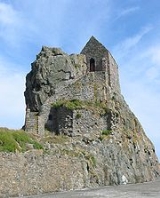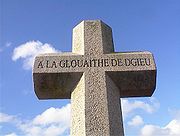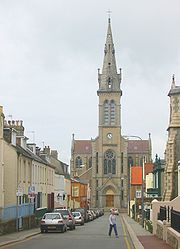
Roman Catholicism in Jersey
Encyclopedia
The Roman Catholic Church in Jersey is part of the worldwide Roman Catholic Church
, under the spiritual leadership of the Pope
and curia
in Rome
.
 Sometime between 535 and 545 Helier
Sometime between 535 and 545 Helier
, who was to become Jersey
's patron saint
, went to the island and brought the gospel
, which is why he is revered there.
until 1204 when King Philip II Augustus of France
conquered the duchy from King John of England
. The islands remained in the personal possession of the king and were described as being a Peculiar of the Crown. However, throughout the Middle Ages
, the Roman Catholic Church did not concern itself with overly political changes and the island continued to be part of the Norman diocese of Coutances. It was reluctant to come under the wing of the English church because it had many ties with Normandy: its language, which was much like that of the Normans; trade links; Norman customary law
; and kinship to families in Normandy.
 The island embraced the French Calvinist form of Protestantism
The island embraced the French Calvinist form of Protestantism
during the Reformation
and the orders were received to remove all signs of Catholicism in 1547 with the Act of Dissolution of the Colleges and Chantries
, which had been applied to Jersey in the Act of Uniformity 1549
: numerous wayside crosses were destroyed along with religious statues and other symbols. In 1550 a Royal Commission
visited the island to sell church property for the benefit of the crown; in 1551 Sir Hugh Pawlet, a member of this Royal Commission, was made Governor of the island and so he returned with a Royal Commission addressed to himself to continue the task. The island remained under the diocese of Coutances until 1569.
, French Roman Catholics took refuge in Jersey, allowed to hold services but not to convert.
In the 1830s and 1840s the island's Catholic community knew growth with the influx of Irish labourers coming to work on major building projects such as the new harbour.
Towards the end of the 19th century Catholic teaching and nursing orders — the De La Salle brothers
, Jesuits
and Little Sisters of the Poor
— settled in Jersey. In 1894, the Jesuits bought a property called Highlands, which later became Highlands College. In 1917, the De La Salle Brothers founded De La Salle College, Jersey
.
, the Germans imported a priest from Normandy who was alleged to have sympathies with the Vichy regime
.
 Today, Jersey is under the diocese of Portsmouth
Today, Jersey is under the diocese of Portsmouth
.
There are eight Roman Catholic churches on the island. However, there is a shortage of priests and workers and the Catholic Church there has therefore had to close two chapels and sell some of its churches.
Minorities of Roman Catholic faith in Jersey are not negligible, as Mass
in certain churches (such as Saint Thomas's, pictured right) is regularly held in Portuguese
and Polish
and only occasionally today in French
. Indeed, 6% of Jersey's population is Portuguese
(especially Madeiran, having come to the island to work in the hotel and catering industry) and among the 6% of Europe
ans there is a large Irish
community and a considerable Polish community.
Roman Catholic Church
The Catholic Church, also known as the Roman Catholic Church, is the world's largest Christian church, with over a billion members. Led by the Pope, it defines its mission as spreading the gospel of Jesus Christ, administering the sacraments and exercising charity...
, under the spiritual leadership of the Pope
Pope
The Pope is the Bishop of Rome, a position that makes him the leader of the worldwide Catholic Church . In the Catholic Church, the Pope is regarded as the successor of Saint Peter, the Apostle...
and curia
Curia
A curia in early Roman times was a subdivision of the people, i.e. more or less a tribe, and with a metonymy it came to mean also the meeting place where the tribe discussed its affairs...
in Rome
Rome
Rome is the capital of Italy and the country's largest and most populated city and comune, with over 2.7 million residents in . The city is located in the central-western portion of the Italian Peninsula, on the Tiber River within the Lazio region of Italy.Rome's history spans two and a half...
.
Conversion in the 6th century

Helier
Saint Helier, a 6th century ascetic hermit, is patron saint of Jersey in the Channel Islands, and in particular of the town and parish of Saint Helier, the island’s capital...
, who was to become Jersey
Jersey
Jersey, officially the Bailiwick of Jersey is a British Crown Dependency off the coast of Normandy, France. As well as the island of Jersey itself, the bailiwick includes two groups of small islands that are no longer permanently inhabited, the Minquiers and Écréhous, and the Pierres de Lecq and...
's patron saint
Patron saint
A patron saint is a saint who is regarded as the intercessor and advocate in heaven of a nation, place, craft, activity, class, clan, family, or person...
, went to the island and brought the gospel
Gospel
A gospel is an account, often written, that describes the life of Jesus of Nazareth. In a more general sense the term "gospel" may refer to the good news message of the New Testament. It is primarily used in reference to the four canonical gospels of Matthew, Mark, Luke, and John...
, which is why he is revered there.
From Roman Catholicism to Protestantism in the Middle Ages
The island of Jersey remained part of the Duchy of NormandyNormandy
Normandy is a geographical region corresponding to the former Duchy of Normandy. It is in France.The continental territory covers 30,627 km² and forms the preponderant part of Normandy and roughly 5% of the territory of France. It is divided for administrative purposes into two régions:...
until 1204 when King Philip II Augustus of France
France
The French Republic , The French Republic , The French Republic , (commonly known as France , is a unitary semi-presidential republic in Western Europe with several overseas territories and islands located on other continents and in the Indian, Pacific, and Atlantic oceans. Metropolitan France...
conquered the duchy from King John of England
John of England
John , also known as John Lackland , was King of England from 6 April 1199 until his death...
. The islands remained in the personal possession of the king and were described as being a Peculiar of the Crown. However, throughout the Middle Ages
Middle Ages
The Middle Ages is a periodization of European history from the 5th century to the 15th century. The Middle Ages follows the fall of the Western Roman Empire in 476 and precedes the Early Modern Era. It is the middle period of a three-period division of Western history: Classic, Medieval and Modern...
, the Roman Catholic Church did not concern itself with overly political changes and the island continued to be part of the Norman diocese of Coutances. It was reluctant to come under the wing of the English church because it had many ties with Normandy: its language, which was much like that of the Normans; trade links; Norman customary law
Norman law
Norman law refers to the customary law of Normandy which developed between the 10th and 13th centuries following the establishment of the Vikings there and which survives today still through the legal systems of Jersey and Guernsey in the Channel Islands....
; and kinship to families in Normandy.

Protestantism
Protestantism is one of the three major groupings within Christianity. It is a movement that began in Germany in the early 16th century as a reaction against medieval Roman Catholic doctrines and practices, especially in regards to salvation, justification, and ecclesiology.The doctrines of the...
during the Reformation
Protestant Reformation
The Protestant Reformation was a 16th-century split within Western Christianity initiated by Martin Luther, John Calvin and other early Protestants. The efforts of the self-described "reformers", who objected to the doctrines, rituals and ecclesiastical structure of the Roman Catholic Church, led...
and the orders were received to remove all signs of Catholicism in 1547 with the Act of Dissolution of the Colleges and Chantries
Chantry
Chantry is the English term for a fund established to pay for a priest to celebrate sung Masses for a specified purpose, generally for the soul of the deceased donor. Chantries were endowed with lands given by donors, the income from which maintained the chantry priest...
, which had been applied to Jersey in the Act of Uniformity 1549
Act of Uniformity 1549
The Act of Uniformity 1549 established The Book of Common Prayer as the sole legal form of worship in England...
: numerous wayside crosses were destroyed along with religious statues and other symbols. In 1550 a Royal Commission
Royal Commission
In Commonwealth realms and other monarchies a Royal Commission is a major ad-hoc formal public inquiry into a defined issue. They have been held in various countries such as the United Kingdom, Australia, Canada, New Zealand, and Saudi Arabia...
visited the island to sell church property for the benefit of the crown; in 1551 Sir Hugh Pawlet, a member of this Royal Commission, was made Governor of the island and so he returned with a Royal Commission addressed to himself to continue the task. The island remained under the diocese of Coutances until 1569.
Waves of Roman Catholic immigration in the 19th century
In the 1790s, during the French RevolutionFrench Revolution
The French Revolution , sometimes distinguished as the 'Great French Revolution' , was a period of radical social and political upheaval in France and Europe. The absolute monarchy that had ruled France for centuries collapsed in three years...
, French Roman Catholics took refuge in Jersey, allowed to hold services but not to convert.
In the 1830s and 1840s the island's Catholic community knew growth with the influx of Irish labourers coming to work on major building projects such as the new harbour.
Towards the end of the 19th century Catholic teaching and nursing orders — the De La Salle brothers
Institute of the Brothers of the Christian Schools
The Institute of the Brothers of the Christian Schools is a Roman Catholic religious teaching congregation, founded in France by Saint Jean-Baptiste de la Salle and now based in Rome...
, Jesuits
Society of Jesus
The Society of Jesus is a Catholic male religious order that follows the teachings of the Catholic Church. The members are called Jesuits, and are also known colloquially as "God's Army" and as "The Company," these being references to founder Ignatius of Loyola's military background and a...
and Little Sisters of the Poor
Little Sisters of the Poor
The Little Sisters of the Poor is a Roman Catholic religious order for women. It was founded in the 19th century by Saint Jeanne Jugan near Rennes, France. Jugan felt the need to care for the many impoverished elderly who lined the streets of French towns and cities.This led her to welcome an...
— settled in Jersey. In 1894, the Jesuits bought a property called Highlands, which later became Highlands College. In 1917, the De La Salle Brothers founded De La Salle College, Jersey
De La Salle College, Jersey
De La Salle College in Jersey is an independent Catholic school taking its name from St John Baptist de la Salle , who founded the Brothers' Order in France.-History:...
.
Occupation of Jersey
During the occupation of the Channel IslandsOccupation of the Channel Islands
The Channel Islands were occupied by Nazi Germany for much of World War II, from 30 June 1940 until the liberation on 9 May 1945. The Channel Islands are two British Crown dependencies and include the bailiwicks of Guernsey and Jersey as well as the smaller islands of Alderney and Sark...
, the Germans imported a priest from Normandy who was alleged to have sympathies with the Vichy regime
Vichy France
Vichy France, Vichy Regime, or Vichy Government, are common terms used to describe the government of France that collaborated with the Axis powers from July 1940 to August 1944. This government succeeded the Third Republic and preceded the Provisional Government of the French Republic...
.
Roman Catholicism in Jersey today

Portsmouth
Portsmouth is the second largest city in the ceremonial county of Hampshire on the south coast of England. Portsmouth is notable for being the United Kingdom's only island city; it is located mainly on Portsea Island...
.
There are eight Roman Catholic churches on the island. However, there is a shortage of priests and workers and the Catholic Church there has therefore had to close two chapels and sell some of its churches.
Minorities of Roman Catholic faith in Jersey are not negligible, as Mass
Mass (liturgy)
"Mass" is one of the names by which the sacrament of the Eucharist is called in the Roman Catholic Church: others are "Eucharist", the "Lord's Supper", the "Breaking of Bread", the "Eucharistic assembly ", the "memorial of the Lord's Passion and Resurrection", the "Holy Sacrifice", the "Holy and...
in certain churches (such as Saint Thomas's, pictured right) is regularly held in Portuguese
Portuguese language
Portuguese is a Romance language that arose in the medieval Kingdom of Galicia, nowadays Galicia and Northern Portugal. The southern part of the Kingdom of Galicia became independent as the County of Portugal in 1095...
and Polish
Polish language
Polish is a language of the Lechitic subgroup of West Slavic languages, used throughout Poland and by Polish minorities in other countries...
and only occasionally today in French
French language
French is a Romance language spoken as a first language in France, the Romandy region in Switzerland, Wallonia and Brussels in Belgium, Monaco, the regions of Quebec and Acadia in Canada, and by various communities elsewhere. Second-language speakers of French are distributed throughout many parts...
. Indeed, 6% of Jersey's population is Portuguese
Portuguese people
The Portuguese are a nation and ethnic group native to the country of Portugal, in the west of the Iberian peninsula of south-west Europe. Their language is Portuguese, and Roman Catholicism is the predominant religion....
(especially Madeiran, having come to the island to work in the hotel and catering industry) and among the 6% of Europe
Europe
Europe is, by convention, one of the world's seven continents. Comprising the westernmost peninsula of Eurasia, Europe is generally 'divided' from Asia to its east by the watershed divides of the Ural and Caucasus Mountains, the Ural River, the Caspian and Black Seas, and the waterways connecting...
ans there is a large Irish
Irish people
The Irish people are an ethnic group who originate in Ireland, an island in northwestern Europe. Ireland has been populated for around 9,000 years , with the Irish people's earliest ancestors recorded having legends of being descended from groups such as the Nemedians, Fomorians, Fir Bolg, Tuatha...
community and a considerable Polish community.
Online
- Jersey Heritage Trust
- Timeline of Jersey History

